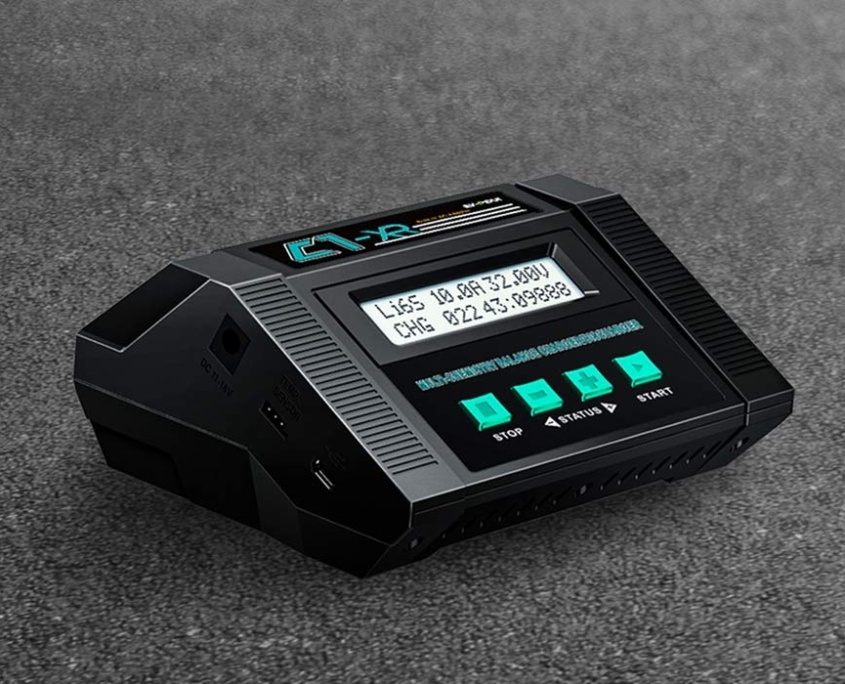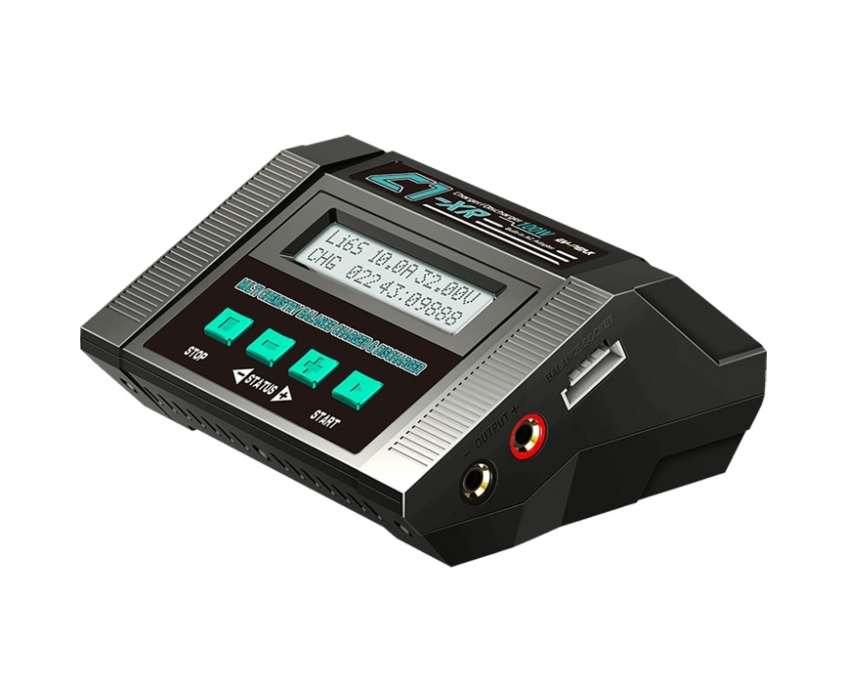RC Battery Chargers: Powering Up Your Remote Control Adventures
Remote control (RC) hobbies have held a special place in the hearts of enthusiasts for decades, offering a thrilling fusion of technology, skill, and enjoyment. Whether one’s passion lies in RC cars, drones, boats, or airplanes, there exists a fundamental element that often escapes notice but remains of utmost importance – the RC battery charger. In this introduction, we delve into the significance of RC chargers within the realm of remote control hobbies and underscore the crucial nature of comprehending the various charger types and their associated features.
The world of remote control hobbies revolves around the relentless pursuit of pushing technological and performance boundaries. This journey would be futile without the presence of dependable power sources. In most RC applications, rechargeable batteries serve as the lifeblood, furnishing the essential energy required to propel motors, control surfaces, or propulsion systems. RC enthusiasts heavily rely on these batteries to keep their vehicles airborne, afloat, or racing along tracks.
Herein lies the pivotal role of RC battery chargers in sustaining and optimizing battery performance. They serve as the gateway to ensuring that your RC vehicle or aircraft attains its zenith in terms of capabilities. Whether you are a seasoned RC veteran or a novice just embarking on this journey, grasping the nuances of battery charging is imperative. It serves not only to safeguard the longevity of your equipment but also to magnify your overall enjoyment of the hobby.
Various Types of RC Battery Chargers
RC chargers come in diverse types, each tailored to specific battery chemistries and applications. A comprehensive understanding of these charger variants is essential for the effective and secure charging of your RC batteries.
NiMH and NiCd Battery Chargers
NiMH (Nickel-Metal Hydride) and NiCd (Nickel-Cadmium) batteries are frequently employed in RC pursuits. Chargers intended for these battery types should incorporate the following features:
1) Delta-Peak Detection: This mechanism aids in averting overcharging by detecting the voltage drop that transpires when the battery attains full charge.
2) Customizable Charge Rates: The ability to select charge rates aligned with your battery’s capacity.
3) Trickle Charge: Provision for a low-current, sustaining charge to keep the battery in a ready-to-use state.

4) Compatibility: Verify that the charger corresponds to your battery’s chemistry (NiMH or NiCd) and voltage.
LiPo Battery Chargers
LiPo (Lithium Polymer) batteries have gained popularity in the RC realm due to their heightened energy density. When utilizing LiPo battery chargers, take the following into account:
1) Balancing: LiPo batteries necessitate balancing to guarantee uniform cell charging, thus averting overcharging or discharging of individual cells.
2) Voltage and Cell Count: Opt for a charger configured with the accurate voltage and cell count settings for your LiPo battery.
3) Safety Containers: Consider employing LiPo safety containers or bags to mitigate the risk of fire in case of overcharging or damage.
LiFe Battery Chargers
LiFe (Lithium Iron Phosphate) batteries offer a more secure alternative to LiPo batteries. When employing LiFe battery chargers, contemplate the subsequent aspects:
1) Voltage Configuration: Confirm that the charger can accommodate the precise voltage of your LiFe battery.
2) Cell Count: Synchronize the charger’s cell count settings with those of your battery.
3) Safety Precautions: While LiFe batteries are less susceptible to thermal issues than LiPo batteries, adherence to safety measures remains paramount.
Crucial Features and Deliberations
To facilitate informed decisions during the selection of RC chargers, take heed of the ensuing key features and considerations:
Charge Rate and Capacity
Compute the charge rate based on your battery’s capacity (expressed in milliampere-hours, or mAh). A safe charge rate generally falls within the range of 1C to 2C, with ‘C’ signifying the battery’s capacity. For instance, a 3000mAh battery should be charged at 3A (1C) or 6A (2C).
Balancing and Safety
1) Ensuring Balanced Charging: If LiPo batteries are in use, opt for chargers equipped with inherent balancing capabilities. Balancing guarantees uniform voltage levels across all cells in the battery pack, enhancing safety and prolonging battery life.
2) Safety Features: Seek chargers encompassing safety functionalities such as overcharge protection, overcurrent safeguards, and temperature monitoring. These safeguards serve to diminish the likelihood of accidents during the charging process.
Portability and Connectivity
1) On-the-Go Charging: If there is a need for battery charging at remote locations or away from home, contemplate the adoption of portable chargers compatible with diverse power sources (e.g., AC, DC, or even vehicular power).
2) Connector Compatibility: Ascertain that your charger aligns with the connectors on your batteries. Frequently encountered connectors include Tamiya, Deans, XT60, and more.

A comprehensive grasp of the distinct types of RC battery chargers and their inherent features is indispensable for the secure and efficient operation of your RC vehicles or aircraft. Ponder the battery chemistry, capacity, and specific requisites when opting for a charger, thus elevating your RC hobby experience while prioritizing safety and optimal performance.
Choosing the Right RC Battery Charger
Selecting the ideal RC battery charger hinges on your experience level and the particular demands of your hobby. Allow us to delve into charger recommendations tailored for novice hobbyists, intermediate to advanced users, and pro-level enthusiasts.
Novice Hobbyists
1) Entry-Level Charger Recommendations: For those embarking on their journey in the world of RC hobbies, simplicity and user-friendliness are paramount. Consider cost-effective chargers equipped with fundamental features:
2) B6AC Compact Charger: This entry-level option offers balanced charging for LiPo batteries, adjustable charge rates, and a straightforward interface.
3) NiMH/NiCd Charger: If your primary battery choice is NiMH or NiCd, opt for a basic charger featuring delta-peak detection and adjustable charge rates.
Intermediate to Advanced Users
1) Choices for Seasoned RC Enthusiasts: As you accumulate experience and expand your collection of RC equipment, you may find the need for more versatile chargers boasting advanced capabilities:
2) iSDT Q6 Pro: This compact powerhouse comes equipped with advanced features such as Bluetooth connectivity for real-time monitoring, high charge rates, and compatibility with a wide range of battery chemistries.
3) Dual-Channel Charger: Consider chargers with dual channels if you frequently charge multiple batteries simultaneously. This is especially beneficial for RC racers and pilots requiring rapid turnaround times.
4) Discharge and Storage Modes: Seek out chargers offering discharge and storage modes to optimize battery health and performance.
Pro-Level Chargers
1) High-End Chargers with Advanced Features: Pro-level RC enthusiasts demand precision, speed, and absolute control. Pro-level chargers offer a slew of advanced capabilities:
2) Chargers from Reputable Brands: Consider chargers from esteemed brands like Graupner, Hyperion, or iCharger, known for providing unparalleled control over charge and discharge processes, customizable settings, and exceptional accuracy.
3) Regenerative Discharge: Certain pro-level chargers feature regenerative discharge, converting excess energy generated during battery discharge back into usable power, thereby enhancing efficiency.
4) Multi-Chemistry Support: Pro-level chargers frequently accommodate a wide array of battery chemistries, including LiPo, LiFe, Li-ion, NiMH, and NiCd.
CONCLUSION
Selecting the right RC chargers is not only critical for the longevity and performance of your batteries but also for elevating your overall RC hobby experience. Regardless of whether you are a novice, an intermediate user, or a pro-level enthusiast, there are chargers tailored to your unique needs and budget.
Novice hobbyists can commence their journey with entry-level chargers offering simplicity and fundamental features. Intermediate to advanced users benefit from versatile chargers equipped with advanced capabilities like multiple channels and discharge modes. Pro-level enthusiasts should invest in high-end chargers that provide precision, multi-chemistry support, and other advanced features, perfectly aligning with the demands of their advanced RC setups.
By selecting the right charger and mastering its features, you’ll not only extend the life of your batteries but also ensure the safety and reliability of your RC vehicles or aircraft. Here’s to a fulfilling and enjoyable RC hobby journey!



